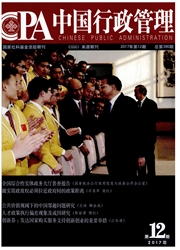

 中文摘要:
中文摘要:
干部作风建设是党的领导人历来十分重视的议题。改革开放以来,中国社会处于激烈的变化中,传统的社会结构和道德观念开始瓦解,新的观念还没有很好地建立,法制环境也在逐步形成和完善之中。在这样的历史背景下,加强干部作风建设,打造新型组织文化,创立良好的国家治理环境,逐渐成为政府管理工作的重中之重。本文探讨和分析了中西方对干部作风建设的不同研究路径、实践经验和话语体系,提出应该总结国内经验、沟通话语体系、借鉴国际经验,通过制度环境建设与制度体系构建等多重方式建立领导干部作风建设的长效机制,以适应我国改革发展的持续性挑战。
 英文摘要:
英文摘要:
China's leaders have always paid serious attention to the work style and ethics of its civil service.Nonetheless,in the process of China's fast change,problems of red-tapes and corruption are still rampant.This paper provides a comparative study between the leadership style and ethics practice and theories between China and the west,and argues that while China and west have different lexicons,terminologies,and discourses in this area,deep down,there are many similarities and common grounds.The Chinese side tends to use periodical movements to enforce its ethics while the western countries tend to build checks and balances in its ethics management system.In order to properly respond to the challenges of China's fast change,a more systematic way is needed for China to design a system of ethics management for executive civil servants.
 同期刊论文项目
同期刊论文项目
 同项目期刊论文
同项目期刊论文
 期刊信息
期刊信息
